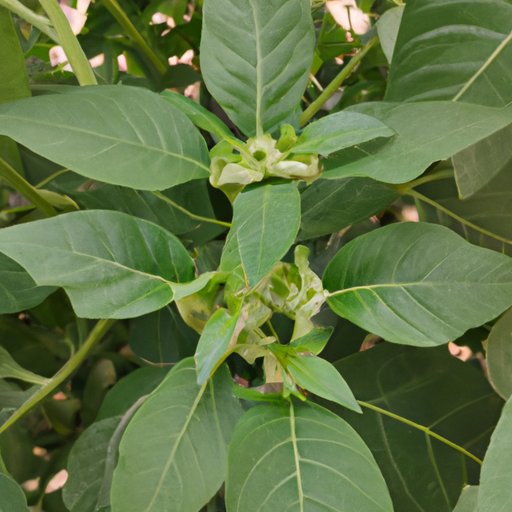Introduction
Ashwagandha is an ancient medicinal herb that has been used for centuries to treat a variety of ailments. Also known as Indian ginseng or winter cherry, ashwagandha is a popular ayurvedic remedy that is believed to have numerous health benefits. This article aims to explore the science behind ashwagandha and how it works in the body, as well as the potential benefits, forms, and risks associated with its use.
Exploring the Science Behind Ashwagandha’s Effects
Ashwagandha is an adaptogenic herb, meaning it helps the body to adapt to stress and resist fatigue. It works by stimulating the hypothalamic-pituitary-adrenal (HPA) axis and increasing levels of cortisol, a hormone that helps the body respond to stress. Higher levels of cortisol can help reduce inflammation, improve mood, and support a healthy immune system.
Ashwagandha also contains several active compounds that are thought to have therapeutic effects, including withanolides, alkaloids, and saponins. These compounds have been studied for their anti-inflammatory, antioxidant, and neuroprotective properties.
What are the Benefits of Taking Ashwagandha?
Studies have shown that ashwagandha may have numerous health benefits, including:
- Reducing anxiety and stress levels
- Improving brain function and memory
- Lowering blood sugar levels
- Reducing inflammation
- Boosting male fertility
- Increasing muscle mass and strength
A 2018 study published in Evidence-Based Complementary and Alternative Medicine found that ashwagandha supplementation significantly reduced symptoms of stress and anxiety in participants, compared to a placebo group. The study concluded that ashwagandha is “an effective and safe treatment” for reducing anxiety and stress.
Examining Different Forms of Ashwagandha
Ashwagandha is available in various forms, including powders, tablets, and extracts. Each form has different benefits and uses. For example, ashwagandha powder is often used in recipes and smoothies, while tablets and extracts are more convenient for taking daily as a supplement.

Understanding the Role of Ashwagandha in Ayurvedic Medicine
Ashwagandha is one of the most important herbs in ayurvedic medicine, an ancient system of healing that originated in India over 3,000 years ago. The herb is widely used in ayurveda to treat a variety of conditions, including stress, anxiety, insomnia, and low energy.
According to ayurveda, ashwagandha has a calming effect on the mind and body and can help balance the three doshas—vata, pitta, and kapha—which are the three energies that make up the human body. It is also believed to promote longevity and vitality.

Studying the Potential Side Effects and Risks of Using Ashwagandha
Although ashwagandha is generally considered safe to take, there are some potential side effects and risks associated with its use. These include stomach upset, diarrhea, and nausea. In addition, it may interact with certain medications, so it’s important to talk to your doctor before taking ashwagandha if you are taking any other medications.
It is also important to note that pregnant and breastfeeding women should not take ashwagandha without consulting their doctor first, as it may cause adverse effects.
Conclusion
In conclusion, ashwagandha is an adaptogenic herb that has been used for centuries to treat a variety of ailments. Studies have shown that ashwagandha may help reduce anxiety and stress levels, improve brain function and memory, lower blood sugar levels, reduce inflammation, boost male fertility, and increase muscle mass and strength. It is available in various forms, including powders, tablets, and extracts, and is traditionally used in ayurvedic medicine. However, it is important to note that there are potential side effects and risks associated with its use, so it is best to speak to your doctor before taking ashwagandha.
(Note: Is this article not meeting your expectations? Do you have knowledge or insights to share? Unlock new opportunities and expand your reach by joining our authors team. Click Registration to join us and share your expertise with our readers.)
